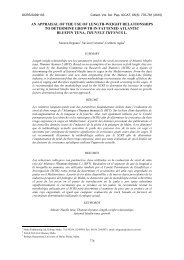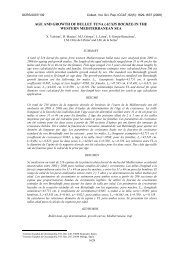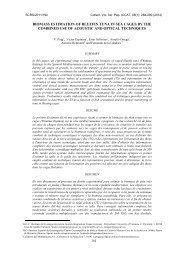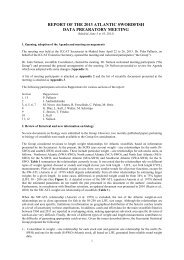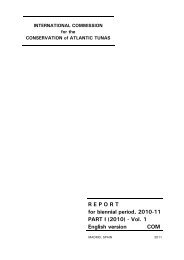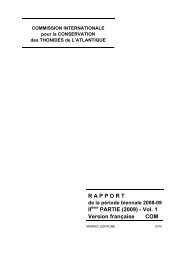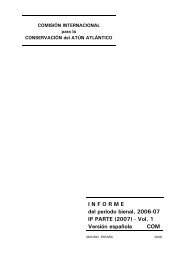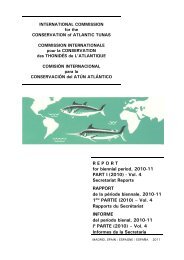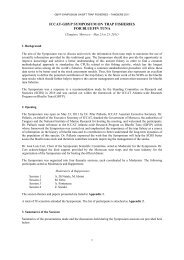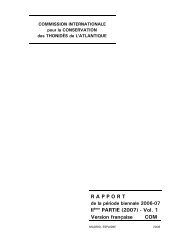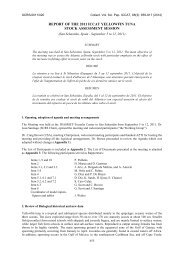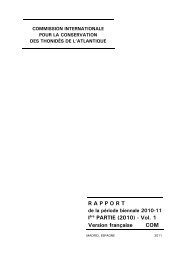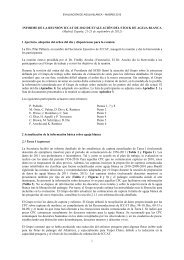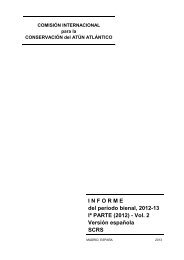E - Iccat
E - Iccat
E - Iccat
You also want an ePaper? Increase the reach of your titles
YUMPU automatically turns print PDFs into web optimized ePapers that Google loves.
PANEL APPENDICES<br />
efforts made by South Africa in forging such a framework, Chinese Taipei would like to present a different way<br />
of thinking to create a more diversified and balanced environment for deliberation of this important matter. As<br />
the below will demonstrate, the logic for this policy statement will, to some extent, follow the respectable work<br />
of South Africa. The main guiding principles for developing the ICCAT sharing formula for South Atlantic<br />
albacore will be summarized first. Then a basic idea for calculation of the quota to be assigned to each of the<br />
active participants will be submitted.<br />
2. Main guiding principles for developing the ICCAT sharing formula for South Atlantic albacore<br />
It is believed that the following principles constitute the cornerstones for building the ICCAT sharing formula<br />
for South Atlantic albacore.<br />
Principle of Legitimacy: The process of quota allocation in ICCAT should not be done in a vacuum. Since<br />
November 2001 the Commission has been able to avail itself of the Criteria for the Allocation of Fishing<br />
Possibilities. It is believed that the legitimacy of any ICCAT sharing formula is based on the consistency of such<br />
Criteria. To be more specific, for each part of any legitimate sharing formula, there must be some justification<br />
based on at least one identifiable item from such Criteria. In this connection, it is hard to agree with the proposal<br />
of South Africa that “as a starting point, …distant water fleets should not be allocated more than 50% of the<br />
South Atlantic albacore”. Apart from lacking any scientific and biological grounds, the disputable nature of such<br />
starting point results from the absence of any justification in South Africa’s paper. It is also stated by South<br />
Africa that “allocation of quota shares between distant water fleets, within the overall allocation to such fleets,<br />
should be proportional to their recent past performance over this period”. It is difficult to accept such a position<br />
for two reasons. First, the “recent past performance” is not equal to the “historical catches”. It is the latter, not<br />
the former term that has a place in the Criteria. Second, even if the “recent past performance” is the rightful<br />
interpretation of the “historical catches”, the application of such criteria, being of a general nature under the<br />
Criteria, is never limited to distant water fleets.<br />
Principle of Transparency: South Africa does not believe it is feasible, or desirable, to attempt to develop a<br />
mathematical sharing formula for South Atlantic albacore, incorporating specific measures and weightings of the<br />
ICCAT Criteria for the Allocation of Fishing Possibilities. Chinese Taipei believes otherwise. The very reason<br />
for ICCAT to take such pain and effort to develop these Criteria was to instill the merits of transparency into the<br />
quota allocation process. The development of a workable sharing formula is yet to be completed. It is precisely<br />
the weighting and the objective way of calculation to implement the rather abstract and vague Criteria that awaits<br />
further development. Undoubtedly, such development will never be an easy matter. But such move is necessary,<br />
if there is any meaning for having reached the Criteria in the first place.<br />
Principle of Minimizing Economic Dislocation of the Participants: With the development concerns of the coastal<br />
countries in mind, the quota allocation process is in fact a re-distribution and adjustment of the present shares of<br />
fishery resources pertaining to each of the participants as reflected in the original quota duly assigned thereto, as<br />
their entitlements to harvest. Hence, from a practical point of view, the key to success of such an exercise is to<br />
address the economic needs of the participants and to minimize their economic dislocation, as part of their<br />
current catch level may be sacrificed or transferred away for ICCAT managerial goals. It should be noted that the<br />
significance of minimizing economic dislocation lies in the necessity for a smooth, predictable, bearable and<br />
manageable transformation in all fishing-related industries of the participants whose current catch level is subject<br />
to such sacrifice. Of course, the legitimacy of such principle is based on IV-21 of the above ICCAT Criteria.<br />
Principle of Providing Opportunity for Development: There are items in this ICCAT Criterion that place<br />
emphasis on addressing the concerns of the developing coastal countries. If we take the view of South Africa in<br />
the preceding paragraph by rejecting the ideas of attaching weighting and adopting mathematical calculation,<br />
these individual criterion for the benefit of developing coastal countries will be unable to receive the value they<br />
deserve respectively.<br />
3. Basic idea for calculation of the quota to be assigned to each of the active participants<br />
Chinese Taipei believes that, after deducting the part of TAC allocated to non-active participants for by-catch, a<br />
legitimate ICCAT sharing formula for South Atlantic albacore should be based on the idea of combining two<br />
distinctive parts allocated to each of the active participants, namely, the share for minimizing economic<br />
dislocation of the participants (the MED Share), and the share to be transferred or re-arranged under the ICCAT<br />
quota management scheme (the TQM Share). It is fundamental that such draft formula be consistent with the<br />
ICCAT Criteria for the Allocation of Fishing Possibilities. Therefore, such draft formula should be based on as<br />
211



